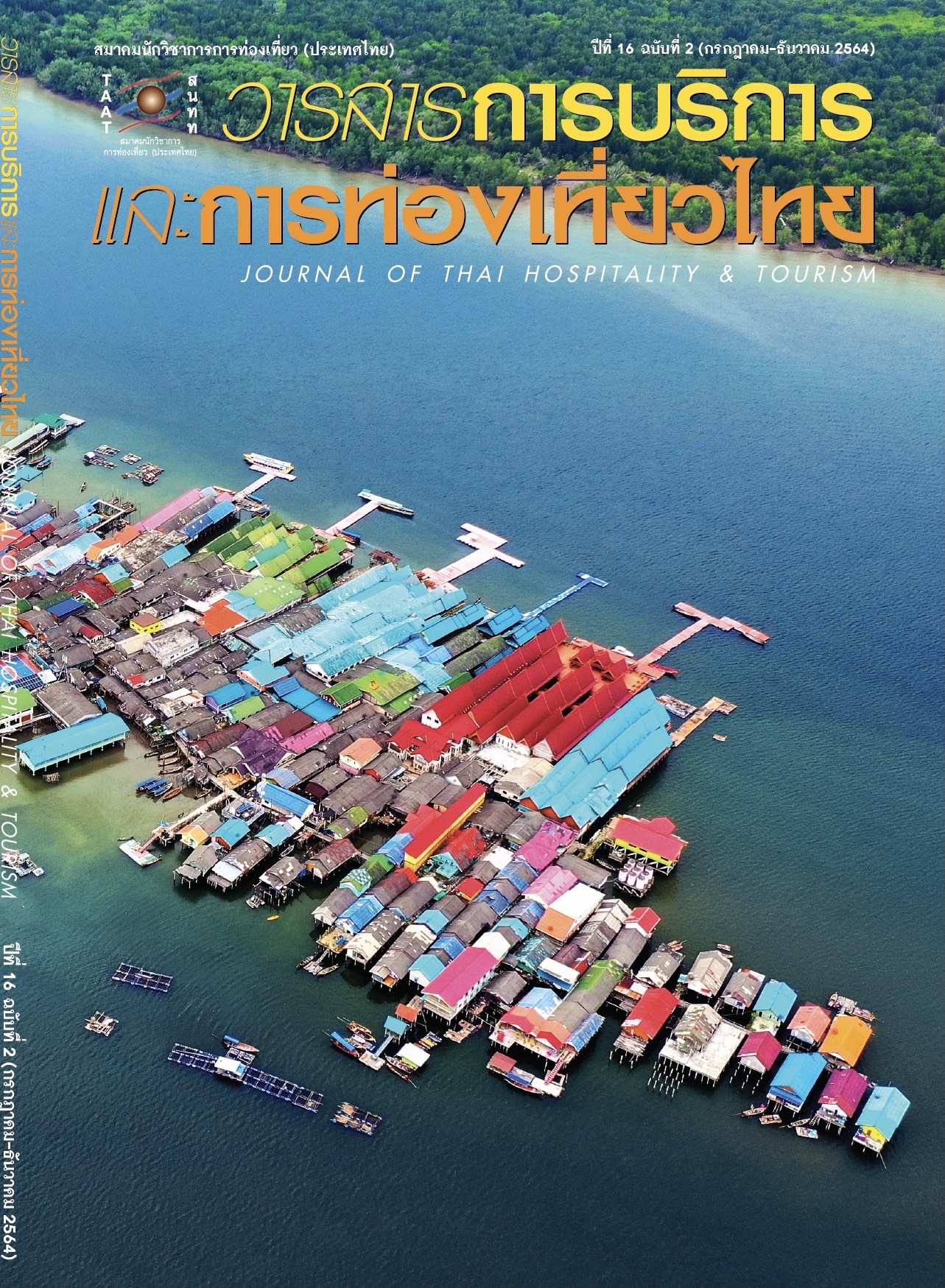การท่องเที่ยวแบบคาร์บอนต่ำ: การรับรู้ และทัศนคติของนักท่องเที่ยวที่เข้าพักในสถานประกอบการภาคีเครือข่ายขององค์การพัฒนาพื้นที่พิเศษเพื่อการท่องเที่ยวที่ยั่งยืน (อพท.)
Main Article Content
บทคัดย่อ
บทความวิจัยนี้ นำเสนอการรับรู้และทัศนคติของนักท่องเที่ยวที่เลือกพักในสถานประกอบการภาคีเครือข่ายขององค์การพัฒนาพื้นที่พิเศษเพื่อการท่องเที่ยวที่ยั่งยืน (อพท.) ต่อการส่งเสริมและสนับสนุนให้เกิดการท่องเที่ยวแบบคาร์บอนต่ำหรือการท่องเที่ยวที่เป็นมิตรกับสิ่งแวดล้อม ซึ่งเป็นหนึ่งในนโยบายที่สำคัญของอพท. ซึ่งมีพันธกิจหลักในการพัฒนาแหล่งท่องเที่ยวให้พื้นที่พิเศษเพื่อการท่องเที่ยวที่ยั่งยืนและเกิดความสมดุลระหว่างเศรษฐกิจ สังคมและสิ่งแวดล้อม โดยมีวิธีศึกษาด้วยวิธีวิทยาเชิงปริมาณด้วยตัวอย่าง จากนักท่องเที่ยวที่เข้าพักในสถานประกอบการภาคีเครือข่ายของอพท. 6 พื้นที่ ได้แก่ พื้นที่พิเศษตราดและหมู่เกาะเชื่อมโยง พื้นที่พิเศษเมืองพัทยาและพื้นที่เชื่อมโยง พื้นที่พิเศษอุทยานประวัติศาสตร์สุโขทัย–ศรีสัชนาลัย–กำแพงเพชร พื้นที่พิเศษเลย พื้นที่พิเศษเมืองเก่าน่าน และพื้นที่พิเศษเมืองโบราณอู่ทอง จำนวน 718 ราย จากสถานประกอบการ 33 แห่ง ระหว่างวันที่ 11–13 และ 25–27 กันยายน พ.ศ. 2558
โดยผลการศึกษาในภาพรวม นักท่องเที่ยวมีการรับรู้และทัศนคติที่ดีต่อการท่องเที่ยวแบบคาร์บอนต่ำโดยเฉพาะในการรับรู้สิ่งที่แต่ละพื้นที่พิเศษได้มีการรณรงค์และส่งเสริมให้นักท่องเที่ยวมีพฤติกรรมการท่องเที่ยวที่เป็นมิตรกับสิ่งแวดล้อมทั้งในด้านการใช้พลังงาน การรับประทานอาหารจากร้านที่ใช้วัตถุดิบท้องถิ่น และการเลือกพาหนะในการเดินทางระหว่างการท่องเที่ยวในพื้นที่พิเศษ ในขณะที่ข้อคำถามเกี่ยวกับการรับรู้ที่เกิดจากการจัดกิจกรรมในภาคปฏิบัติจากส่วนกลาง นักท่องเที่ยวมีการรับรู้ที่น้อยกว่า เมื่อเปรียบเทียบกลุ่มนักท่องเที่ยวชาวไทยและต่างประเทศพบว่านักท่องเที่ยวชาวไทยมีการรับรู้เกี่ยวกับการท่องเที่ยวแบบคาร์บอนต่ำมากกว่านักท่องเที่ยวชาวจีนอย่างมีนัยสำคัญ จากการวิเคราะห์การถดถอยและสหสัมพันธ์พบว่า นักท่องเที่ยวที่มีอายุ และเลือกใช้ผลิตภัณฑ์ประหยัดพลังงานเป็นประจำจะมีการรับรู้เกี่ยวกับการท่องเที่ยวแบบคาร์บอนต่ำมากกว่านักท่องเที่ยวในกลุ่มตรงข้าม อย่างไรก็ตามทัศนคติที่ดีหรือไม่ดีต่อการท่องเที่ยวแบบคาร์บอนต่ำไม่มีผลต่อการรับรู้เกี่ยวกับการท่องเที่ยวที่เป็นมิตรกับสิ่งแวดล้อม ผลการศึกษาในบทความนี้สามารถใช้เป็นข้อมูลพื้นฐานในการรณรงค์และส่งเสริมให้นักท่องเที่ยวตระหนัก ให้ความสำคัญ และมีพฤติกรรมการท่องเที่ยวที่เป็นมิตรกับสิ่งแวดล้อมอันนำไปสู่การท่องเที่ยวที่ยั่งยืนในฝั่งของนักท่องเที่ยวได้
Article Details
เอกสารอ้างอิง
Cape Town Declaration. (2012). Cape Town Conference on Responsible Tourism in Destinations. Retrieved from http://www.capetown.gov.za/en/tourism/Documents/ResponsibleTourism/Tourism_RT_2002_Cape_Town_Declaration.pdf
Chandrashekara, B. & Vishwanatha, S. (2014). Economic Impacts of Ecotourism – A Perceptional Study. International Journal of Innovative Research & Study, 3(3), 15–23.
Chiesa, T. & Gautam, A. (2009). Towards a Low Carbon Travel & Tourism Sector: World Economic Forum. Geneva: Booz & Company.
Cooper, C., Fletcher, J., Fyall, A., Gilbert, D. & Wanhill, S. (2005). Tourism: Principle and Practice. Essex: Pearson Education Limited.
Diamantis, D. (2004). Ecotourism Management: An Overview. Diamantis Dimitrios, Ecotourism. London: Thomson Learning.
Korosi, V. & Hernan, D. (2013). Environment and Social Impacts of Ecotourism: A Comparative Analysis of Assessment Procedures between Australia and Mexico. New South Wales: University of Wollongong.
Sustainable Tourism. (n.d.). Definition. Retrieved from http://www.sustainabletourism.net/sustainable-tourism/definitions/
United Nations Environment Programme. (n.d.). Tourism’s Three Main Impact Areas. Retrieved from http://www.unep.org/resourceefficiency/Business/SectoralActivities/Tourism/FactsandFiguresaboutTourism/ImpactsofTourism/EnvironmentalImpacts/TourismsThreeMainImpactAreas/tabid/78776/Default.aspx
Wattanachaiyingcharoen, R. (2008). Life and Environment: Living Things and Its Existence. Bangkok: Aksorn Charoentat.
Wearing, S. & Neil J. (2009). Ecotourism: Impacts, Potentials, and Possibilities? Oxford: Butterworth-Heinemann.
World Tourism Organization. (n.d.). Sustainable Development of Tourism. Retrieved from http://sdt.unwto.org/content/about-us-5


